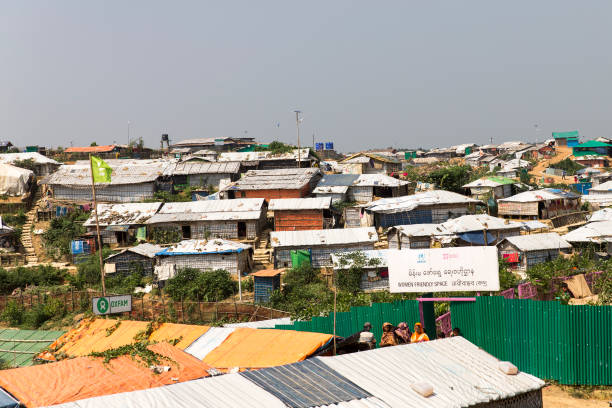In 1991, a committee in Stockholm announced that year’s Nobel Peace Prize was awarded to Aung San Suu Kyi “for her non-violent struggle for democracy and human rights” in her home country of Myanmar – formerly known as Burma. She was kept on house arrest by the military after challenging the powers at play in her country that maintained a firm grip on democracy and freedom of its civilians. After her release in 2010, she resumed her political career with the National League for Democracy and in 2016 became the prime minister of Myanmar (the de-facto leader). Her win brought hope to the international community, especially those that were pleading for the stopping of the Myanmar military persecution of its Muslims minority, the Rohingya. But, as Muhammad Abdul Bari explains in his new book, The Rohingya Crisis: A People Facing Extinction, San Suu Kyi hasn’t done anything and worse, the Rohingya are facing genocide by their own country.
The Rohingya Crisis: A People Facing Extinction by Muhammad Abdul Bari
An Eye-Opening Account
Abdul Bari’s book is short but a detailed account on how one of Myanmar oldest minorities is being persecuted, killed, raped and even chased outside their homes and their country. He takes a good look at the excuses of the Myanmar government on persecuting the Rohingya and draws a picture of its main authors. Abdul Bari makes it clear from the start that these atrocities by the military are not new, how Nationalist monks have played a key role and how Aung San Suu Kyu’s silence is a revelation on where she stands on this issue.
The book does a great job debunking the first myth of the Rohingya being Bengalese immigrants and explains the arrival of Muslim civilians to the Burmese kingdom. As Abdul Bari explains, “Muslims arrived in what was then the independent kingdom of Arakan (now Rakhine) as long ago as in the eight centuries, around the time when the Vikings visited Britain in 789 CE.” He then goes to explain the power of those that have shaped Burma but have forgotten about their Muslim minorities, even when a new constitution was drawn in 1947. As Abdul Bari tells us, the Rohingya are “stateless in Myanmar”.
Abdul Bari then points to those who have been silent, like the United Nations and those who are igniting the fire on the Myanmar Buddhist majority. One example is that of the Buddhist monk, Ashin Wirathu, who supported the plan of previous Myanmar president Thein Sein on resettling the Rohingya in other countries. Although Buddhism is always associated with peace, in Myanmar, such groups have taken a nationalistic stance that has played a big role in the de-humanization of Rohingya people. In an article by The Guardian, Michael Safi explains the role that Facebook played on this slow-moving genocide: “Evidence of the spike emerged after the platform was accused of playing a key role in the spread of hate speech in Myanmar at a time when 650,000 Rohingya refugees were forced to flee to Bangladesh following persecution.”
Aung San Suu Kyi’s Silence
Abdul Bari then takes aim at the leader of Myanmar, and the former face of peace of the international community, Aung San Suu Kyi:
“The role of Suu Kyi is ironic in the whole Rohingya saga. As a champion of democracy who suffered under military rule in the past, the international community expected she would bring, or at least make a serious effort to bring a fresh air of ethical politics to Myanmar. However, she remained elusive on the continued suffering and violations of human rights endured by the Rohingya minority and made no attempt whatsoever to redress their plight.”
After detailing the main corrupters of the so-call democracy of Myanmar, Abdul Bari goes on to describe the atrocities that the Rohingya are suffering: from rape to homes being burned, to a massive exodus to their neighbor country, Bangladesh. What’s most astonishing is the hopelessness that the Rohingya face with the moves of giant powers like China, India and the US for a piece of the pie of Myanmar. None of these countries seem to have any rush to help the Muslim minority of Myanmar; the closest that is has gotten was this month when Vice President Mike Pence demanded Aung San Suu Kyi to release two journalists that have been kept captive for releasing information concerning the abuse of the military towards the Rohingya – San Suu Kyi yelled at the VP, saying that they leaked top-secret information.
Last Word on The Rohingya Crisis
Abdul Bari accounts is an eye-opening account on how the world has turned a blind eye while a Nobel Laureate, alongside the military, embarked on a genocide. Cases like those of the Bosnian Muslims or the Rwanda genocide has taught us that history tends to judge those who play a role in such cruel acts, but what about the present? At this moment, over 800,000 Rohingya are sheltered in Bangladesh and more deaths keep piling up. Can the world stand still seeing such horrendous acts? Bari’s account is a cry for help and a tour of knowledge for those that haven’t received the message.
Main Image Credit:

